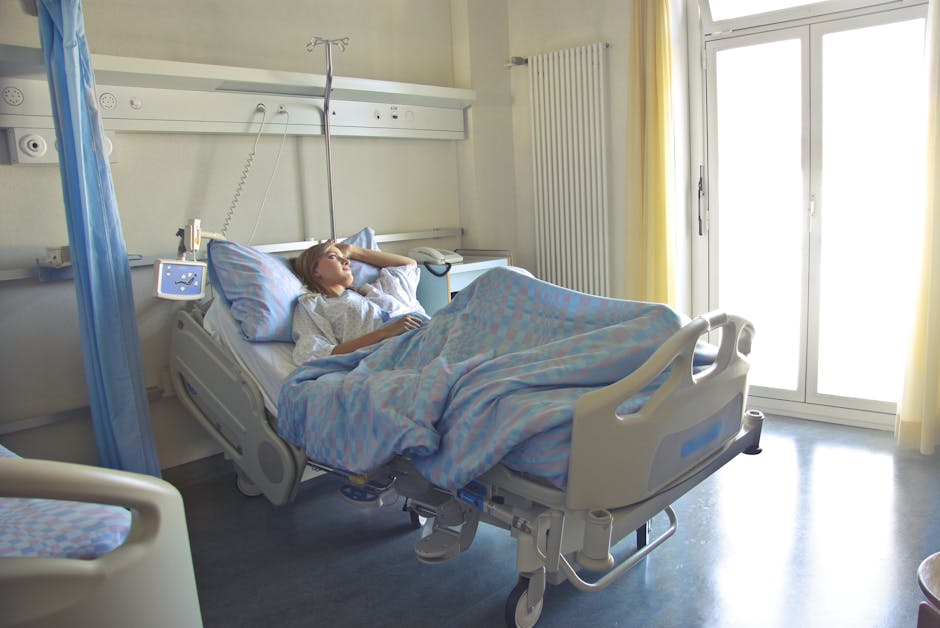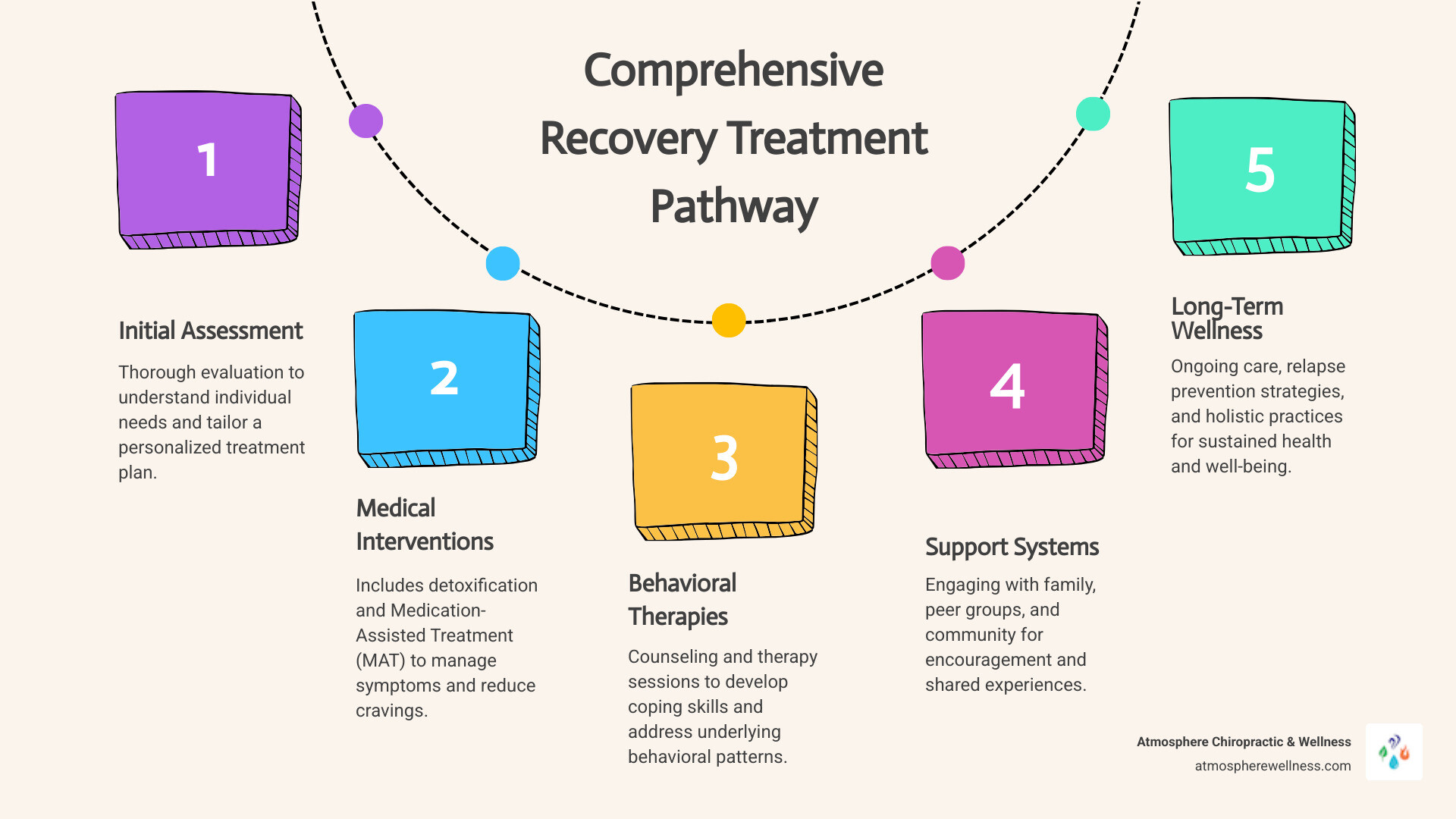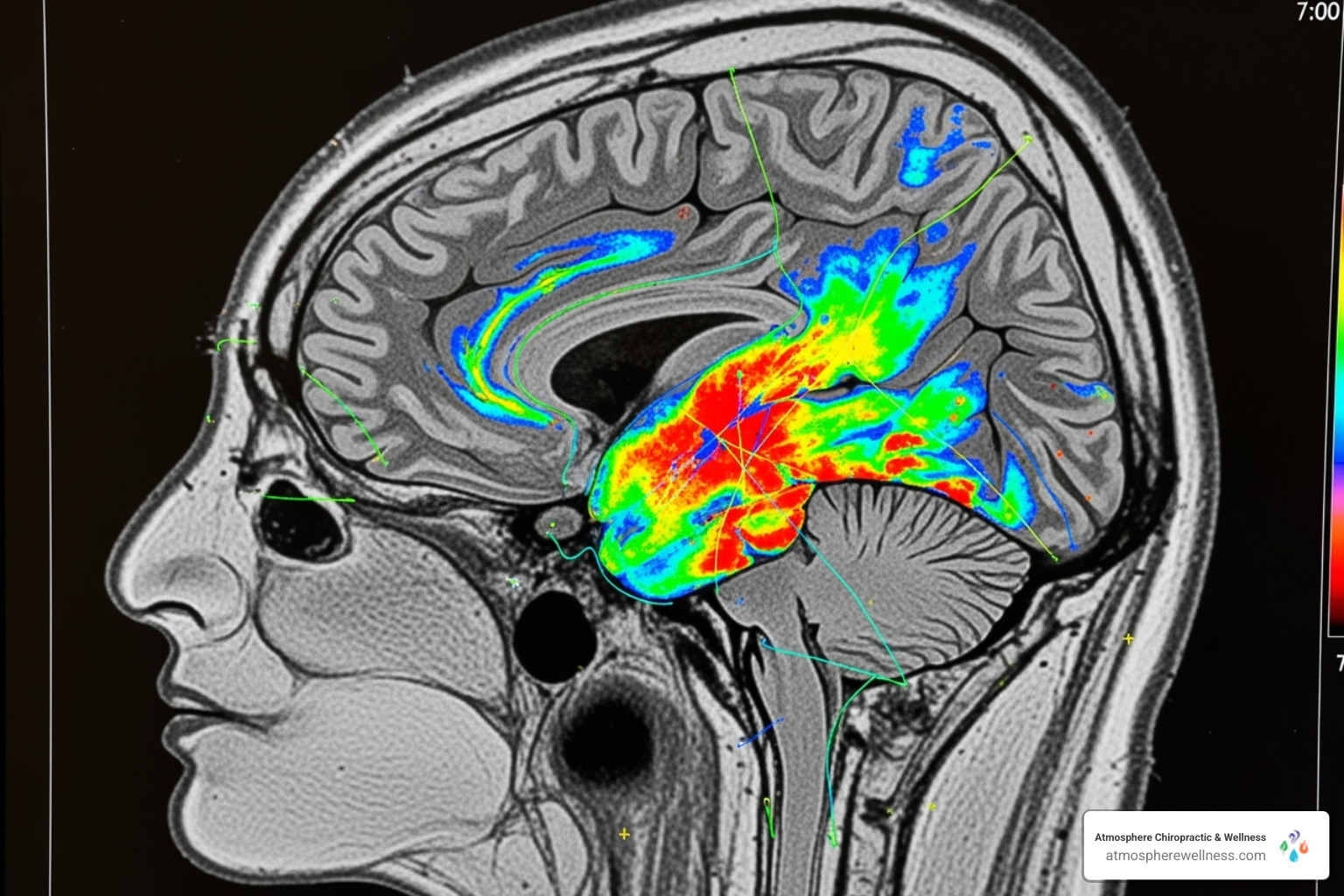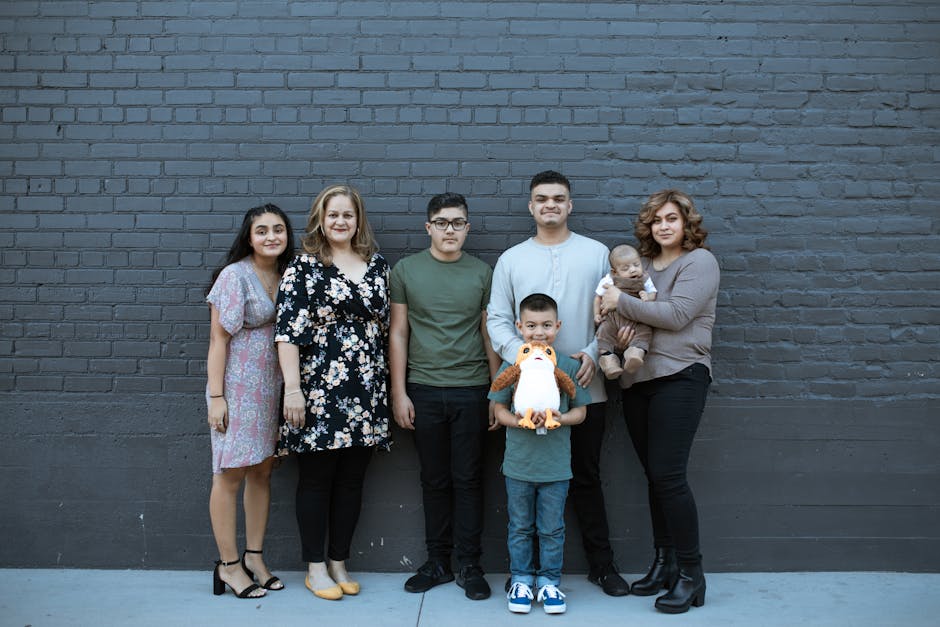The Ins and Outs of Recovery Treatments

Why Recovery Treatments Are Essential for Healing and Wellness
Recovery treatments are evidence-based therapies designed to help individuals overcome substance use disorders, manage chronic conditions, and restore overall wellness. Understanding your options is the first step toward healing, whether you're recovering from an injury or seeking help for addiction.
Key types of recovery treatments include:
- Behavioral Therapies: Cognitive-behavioral therapy, motivational interviewing
- Medical Interventions: Medication-assisted treatment, detoxification
- Support Systems: Peer groups, family support, 12-step programs
- Holistic Wellness: Physical therapy, stress reduction, complementary treatments
- Long-term Management: Ongoing care, relapse prevention
Recovery is about restoring the body's natural ability to heal. Research shows that while many Americans experience substance use disorders, recovery is possible with the right support. The journey requires individualized care that addresses the whole person-their physical, mental, and social well-being. For treatment to be effective, it must be readily available, address multiple needs, and continue for an adequate period.
Understanding that addiction is a chronic, treatable disease helps remove stigma and opens the door to hope. Recovery treatments work by restoring healthy brain function, teaching coping skills, and building strong support networks.
I'm Dr. Gannon Ward, and for over 15 years, I've helped patients achieve wellness through comprehensive recovery treatments. My experience shows that combining evidence-based medical care with holistic therapies like chiropractic care, cryotherapy, and red light therapy creates the most effective path to lasting recovery.

Must-know recovery treatments terms:
Understanding Substance Use Disorder (SUD) and the Path to Recovery

Substance use disorder is not a sign of weakness or a moral failing. Substance use disorder (SUD) is a real medical condition that changes how the brain works, making it incredibly difficult to stop using substances without professional help. Similar to other chronic diseases like diabetes, SUD affects the brain's reward system, decision-making, and impulse control. Because SUD causes literal changes in the brain, willpower alone is rarely enough, which is why professional recovery treatments are so important.
What is substance use disorder (SUD)?
SUD is a mental health condition involving changes in brain function that affect a person's control over their substance use. The scientific research on drug misuse and addiction confirms this is a matter of brain chemistry, not character.
Someone with SUD continues using substances despite the serious problems it causes. This can manifest as impaired control over use, social impairment in relationships and responsibilities, or risky use in dangerous situations. The brain's response to substances also creates tolerance (needing more for the same effect) and withdrawal symptoms. SUD can range from mild to severe and affects people from all walks of life, so treatment should be approached with compassion.
What are the signs that might prompt someone to seek help?
Recognizing the signs of SUD can be challenging. They often appear gradually and affect different areas of life.
- Behavioral changes: Neglecting responsibilities at work, school, or home. A dramatic shift in social circles or engaging in risky behaviors like driving under the influence.
- Physical signs: Significant weight changes, poor hygiene, or unexplained injuries. Experiencing withdrawal symptoms like nausea or tremors when the substance isn't available. Developing tolerance and needing more of the substance for the same effect.
- Psychological changes: Increased anxiety, depression, or dramatic mood swings. A loss of interest in once-loved activities or struggles with memory and concentration.
- Financial problems: Unexplained financial issues often arise as money is redirected toward obtaining substances.
If these signs are familiar, know that help is available and recovery is possible.
How can stigma impact the journey to recovery?
Stigma is often the biggest barrier to getting help. When society treats addiction as a moral failing instead of a medical condition, it creates overwhelming shame and guilt. This stigma becomes a barrier to seeking treatment, as people fear judgment from doctors, employers, or family.
The result is often isolation and hopelessness. Viewing addiction as a treatable disease changes everything. Approaching SUD with empathy opens doors to healing. Everyone deserves compassion and access to effective recovery treatments. Seeking help is a sign of strength, and with the right support, people can and do recover every day.
The Core Principles and Stages of Effective Recovery Treatments

Effective recovery treatments are not one-size-fits-all. Like finding the right pair of shoes, treatment must be personalized to an individual's unique needs, challenges, and goals. At Atmosphere Chiropractic & Wellness, we've seen how this personalized approach makes all the difference.
What are the key principles of effective SUD treatment?
Research has identified several core principles for effective recovery treatments, as outlined in the Principles of Drug Addiction Treatment: A Research-Based Guide.
- No single treatment works for everyone. Treatment should be customized to a person's substance use patterns, mental health needs, and life circumstances.
- Treatment must be readily available. When someone is ready for help, delays can be dangerous. Immediate access to care is critical.
- Effective treatment addresses the whole person. It must go beyond substance use to address relationships, work, physical health, and mental well-being.
- Staying in treatment long enough is crucial. SUD is a chronic condition, and longer engagement with treatment generally leads to better outcomes.
- Counseling and behavioral therapies are foundational. These approaches help individuals understand the roots of their substance use and develop new coping skills.
What are the stages of treatment for SUDs?
Recovery is a winding path with distinct stages. Understanding them can help you recognize your progress.
- Early Stage: This focuses on engagement and stabilization. It may include detoxification to manage withdrawal symptoms. The goal is to feel stable and hopeful.
- Middle Stage: This is where the work of building skills and addressing deeper issues begins. You learn new coping strategies and address underlying problems like trauma.
- Late Stage: The focus shifts to relapse prevention and long-term goals. You build a "culture of recovery" by identifying triggers and developing strategies to manage them.
- Maintenance: This is the ongoing, lifelong journey of recovery. It requires continued attention, such as regular check-ins or support group participation.
Moving between stages is a normal part of the learning process.
How does recovery differ for individuals?
Every recovery journey is unique. Personalized treatment plans are essential to account for the type of substance used, co-occurring mental health conditions, cultural background, and personal goals.
Your triggers and challenges are your own. Effective treatment helps you understand your specific patterns to build effective coping strategies. Since many people with SUD also have depression, anxiety, or PTSD, the most effective recovery treatments address both substance use and mental health simultaneously.
Cultural competence is also vital, ensuring that a person's background and values are respected. Success looks different for everyone; for some, it's complete abstinence, while for others, it's improved functioning and quality of life.
Real-world results show the importance of individualized, recovery-focused care. For example, some models have led to significant reductions in drug-poisoning deaths, while other approaches have seen fatalities increase. With the ongoing opioid crisis, the need for effective, personalized recovery treatments has never been clearer.
A Closer Look at Medical and Therapeutic Interventions

Effective recovery treatments often combine medical and therapeutic approaches. Behavioral therapies provide a foundation for new ways of thinking, medications can ease withdrawal and cravings, and support groups offer connection with others on a similar journey.
What are the different types of recovery treatments for SUDs?
Recovery treatments come in many forms, and the best plans often combine several methods. Behavioral therapies are the cornerstone, helping reshape thoughts and responses to triggers. Medications play a crucial supporting role for opioid, alcohol, or nicotine addiction by making the healing process more manageable. Support groups, like 12-step programs, provide the power of shared experience.
Treatment settings vary based on need. Inpatient rehabilitation offers intensive, 24/7 care in a structured environment, while outpatient programs provide flexibility to maintain work and family life while attending regular therapy. You can use resources like the Behavioral Health Treatment Services (SAMHSA) locator to find services near you.
| Feature | Inpatient Rehabilitation | Outpatient Programs |
|---|---|---|
| Environment | Structured, distraction-free, 24/7 care | Flexible, allows living at home, integrates with daily life |
| Intensity | Highly intensive, daily therapy sessions | Less intensive, scheduled sessions (e.g., weekly) |
| Duration | Typically shorter (30-90 days) | Can be longer-term, ongoing |
| Support | Constant medical and therapeutic supervision | Relies on external support systems and personal accountability |
| Cost | Generally higher due to residential stay | Generally lower |
| Suitability | Severe SUD, co-occurring disorders, unstable home environment | Mild to moderate SUD, strong home support, work/school commitments |
What is the role of medication in treating addiction?
Medication is a valuable tool in recovery treatments, giving your brain support while you learn new coping skills. It helps by:
- Managing withdrawal symptoms: Medications like methadone or buprenorphine make opioid withdrawal more bearable.
- Reducing cravings: Naltrexone can significantly reduce urges for opioids and alcohol, creating space to practice healthy coping strategies.
- Preventing relapse: Medications for opioid use disorder help people stay in treatment longer and reduce overdose risk.
This approach is known as Medication-Assisted Treatment (MAT). You can learn more at Medication-Assisted Treatment (MAT) | SAMHSA.
How do behavioral therapies contribute to recovery?
Behavioral therapies are where you learn practical tools to handle life differently.
- Cognitive-Behavioral Therapy (CBT): Helps you recognize and change the thinking patterns that lead to substance use.
- Motivational Interviewing: A gentle, non-judgmental approach that helps you find your own motivation for change.
- Contingency Management: Uses positive reinforcement, like small rewards, to encourage healthy behaviors.
- Family therapy: Heals relationships, improves communication, and creates a supportive home environment.
The goal of these therapies is to equip you with lasting life skills for managing stress and emotions without relying on substances.
The Crucial Role of Support and Long-Term Management

Recovery is like tending a garden; the initial work is just the beginning. Recovery treatments require ongoing care and strong support systems to thrive long-term. At Atmosphere Chiropractic & Wellness, we know that continued care and loving support are key to changing lives.
How important is ongoing care in maintaining recovery?
Addiction is a chronic condition that requires long-term management, much like diabetes or heart disease. It's not a problem you solve once and forget.
Ongoing care acts as a safety net, helping you manage challenges before they become major problems. Regular check-ins with a care team allow for practicing coping strategies and tackling new life stressors. As your life evolves, your treatment plan can be adjusted to meet your changing needs. Most importantly, continued counseling and follow-up help sustain the progress you've worked so hard to achieve, allowing you to build a life you love.
What is the role of support systems like family and peer groups?
Support systems make the recovery journey less lonely and more manageable. Family support is a game-changer; when loved ones understand your journey and celebrate your milestones, it makes a significant difference. Family therapy can help heal damaged relationships and create a supportive home environment.
Peer support groups, such as Alcoholics Anonymous or Narcotics Anonymous, offer the unique understanding that comes from shared experience. Hearing from others who have been in your shoes can be incredibly powerful. These groups reduce isolation and provide practical advice for navigating daily life. As noted by health experts, social support plays a vital role in recovery.
Does relapse mean treatment has failed?
Absolutely not. Relapse is common in chronic conditions, including addiction. It has similar rates to other medical illnesses like high blood pressure or asthma. It is not a sign of weakness or failure but rather a part of the process for many.
A relapse is an opportunity to reassess and strengthen your recovery plan. It can help you and your care team identify new triggers or areas where coping strategies need to be adjusted. The key is to respond quickly and compassionately, using the experience as valuable information to improve your recovery treatments moving forward. Recovery is rarely a straight line; what matters is continuing to move toward the healthy life you deserve.
Finding Help and Complementary Therapies for Holistic Wellness

Taking the first step toward recovery treatments can feel overwhelming, but help is available. At Atmosphere Chiropractic & Wellness in Lehi, Utah, we believe in a holistic approach that addresses the whole person-mind, body, and spirit. We combine evidence-based medical care with innovative complementary therapies to support your body's natural ability to heal.
How can individuals find appropriate treatment services?
Finding the right care starts with knowing where to look.
- SAMHSA's National Helpline: Call 1-800-662-HELP (4357) for a free, confidential, 24/7 connection to treatment centers and support groups.
- Online Treatment Locators: Use tools like the SAMHSA Behavioral Health Treatment Services Locator to search for services by location and payment options.
- Primary Care Provider: Your doctor knows your health history and can provide personalized referrals.
- Insurance Resources: Call your insurance provider to understand your coverage for recovery treatments and get a list of in-network providers.
- Community Resources: Local health departments and non-profits often offer support groups and other helpful services.
How do complementary recovery treatments support overall wellness?
While medical and behavioral therapies are foundational, complementary recovery treatments can be game-changers. At Atmosphere Chiropractic & Wellness, we offer multiple innovative therapies in one location to serve Lehi, Utah, and the surrounding areas.
- Stress Reduction: Our chiropractic care improves nervous system function, helping your body manage stress naturally. Learn more in our guide to 4 Reasons to Focus on Chiropractic Wellness.
- Pain Management: Chronic pain can be a major trigger. Our cryotherapy for pain relief releases your body's natural anti-inflammatory and pain-fighting substances.
- Improved Sleep: Many in recovery struggle with sleep. Red light therapy and therapeutic massage can promote deeper, more restorative rest. Our Red Light Therapy Benefits guide explains how it helps your body repair itself.
- Physical Recovery: Our specialized Injury Recovery Therapy services integrate multiple modalities to restore function and reduce pain from injuries or the physical effects of substance use.
- Mental Clarity: By reducing physical discomfort and stress, these therapies can improve focus, concentration, and overall mental well-being, which are crucial for sustained recovery.
Frequently Asked Questions about Recovery
Many questions arise on the journey of recovery treatments. As a provider at Atmosphere Chiropractic & Wellness, I've heard these common concerns and want to address them with clarity.
Can addiction be cured, or is it a chronic condition?
Addiction is not "cured" in the traditional sense. It is a chronic, manageable disease that requires ongoing attention, much like diabetes or heart disease. This is empowering because it means that with proper recovery treatments and ongoing care, individuals can achieve lasting recovery and live full, healthy lives. The focus shifts from a permanent "cure" to achieving remission and maintaining quality of life.
What is Opioid Agonist Therapy (OAT) and how does it work?
Opioid Agonist Therapy (OAT), also known as Medication-Assisted Treatment for opioid use disorder, is a highly effective medical approach. It uses medications like methadone or buprenorphine to work with the body's chemistry. These medications activate the same brain receptors as illicit opioids in a controlled, therapeutic way. This prevents withdrawal symptoms and reduces intense cravings, which stabilizes brain chemistry that has been disrupted by chronic opioid use. This stability allows a person to fully engage in the counseling and behavioral therapies that are crucial for recovery.
How can I help a loved one on their path to recovery?
Supporting a loved one requires a balance of love, boundaries, and patience. Here are some effective strategies:
- Offer non-judgmental support: Approach your loved one with compassion, not criticism.
- Encourage professional help: Offer to help them research treatment options, but respect their autonomy.
- Set healthy boundaries: You can love someone while maintaining limits on what behaviors you will accept. This protects your own well-being.
- Educate yourself about addiction: Understanding it as a disease helps you respond more effectively.
- Celebrate their progress: Acknowledging milestones, no matter how small, provides crucial encouragement.
Support groups like Al-Anon exist for family members, so remember to seek support for yourself as well.
Conclusion
Recovery is a deeply personal journey, and it is absolutely achievable. Healing from substance use disorder, an injury, or other health challenges is happening every day. The path forward isn't always straight, but it's always worth taking because it honors the incredible resilience of the human spirit.
There is no single "right" way to recover. Success can be found through behavioral therapy, support groups, medication-assisted treatment, or a combination of approaches. Many find that holistic approaches combining medical care with complementary therapies create the most comprehensive healing experience.
At Atmosphere Chiropractic & Wellness in Lehi, Utah, this is our core belief. We see the power of combining chiropractic care, cryotherapy, red light therapy, and therapeutic massage-all under one roof-to support the body's own healing systems.
Hope and help are always available. When evidence-based recovery treatments meet innovative supportive therapies, your body can heal, your spirit can find hope, and your life can flourish. You don't have to do it alone.
We are here to support your journey toward optimal health. Learn more about our massage and physical therapy services and find out how we can be part of your path to lasting wellness.

Why Recovery Treatments Are Essential for Healing and Wellness
Recovery treatments are evidence-based therapies designed to help individuals overcome substance use disorders, manage chronic conditions, and restore overall wellness. Understanding your options is the first step toward healing, whether you're recovering from an injury or seeking help for addiction.
Key types of recovery treatments include:
- Behavioral Therapies: Cognitive-behavioral therapy, motivational interviewing
- Medical Interventions: Medication-assisted treatment, detoxification
- Support Systems: Peer groups, family support, 12-step programs
- Holistic Wellness: Physical therapy, stress reduction, complementary treatments
- Long-term Management: Ongoing care, relapse prevention
Recovery is about restoring the body's natural ability to heal. Research shows that while many Americans experience substance use disorders, recovery is possible with the right support. The journey requires individualized care that addresses the whole person-their physical, mental, and social well-being. For treatment to be effective, it must be readily available, address multiple needs, and continue for an adequate period.
Understanding that addiction is a chronic, treatable disease helps remove stigma and opens the door to hope. Recovery treatments work by restoring healthy brain function, teaching coping skills, and building strong support networks.
I'm Dr. Gannon Ward, and for over 15 years, I've helped patients achieve wellness through comprehensive recovery treatments. My experience shows that combining evidence-based medical care with holistic therapies like chiropractic care, cryotherapy, and red light therapy creates the most effective path to lasting recovery.

Must-know recovery treatments terms:
Understanding Substance Use Disorder (SUD) and the Path to Recovery

Substance use disorder is not a sign of weakness or a moral failing. Substance use disorder (SUD) is a real medical condition that changes how the brain works, making it incredibly difficult to stop using substances without professional help. Similar to other chronic diseases like diabetes, SUD affects the brain's reward system, decision-making, and impulse control. Because SUD causes literal changes in the brain, willpower alone is rarely enough, which is why professional recovery treatments are so important.
What is substance use disorder (SUD)?
SUD is a mental health condition involving changes in brain function that affect a person's control over their substance use. The scientific research on drug misuse and addiction confirms this is a matter of brain chemistry, not character.
Someone with SUD continues using substances despite the serious problems it causes. This can manifest as impaired control over use, social impairment in relationships and responsibilities, or risky use in dangerous situations. The brain's response to substances also creates tolerance (needing more for the same effect) and withdrawal symptoms. SUD can range from mild to severe and affects people from all walks of life, so treatment should be approached with compassion.
What are the signs that might prompt someone to seek help?
Recognizing the signs of SUD can be challenging. They often appear gradually and affect different areas of life.
- Behavioral changes: Neglecting responsibilities at work, school, or home. A dramatic shift in social circles or engaging in risky behaviors like driving under the influence.
- Physical signs: Significant weight changes, poor hygiene, or unexplained injuries. Experiencing withdrawal symptoms like nausea or tremors when the substance isn't available. Developing tolerance and needing more of the substance for the same effect.
- Psychological changes: Increased anxiety, depression, or dramatic mood swings. A loss of interest in once-loved activities or struggles with memory and concentration.
- Financial problems: Unexplained financial issues often arise as money is redirected toward obtaining substances.
If these signs are familiar, know that help is available and recovery is possible.
How can stigma impact the journey to recovery?
Stigma is often the biggest barrier to getting help. When society treats addiction as a moral failing instead of a medical condition, it creates overwhelming shame and guilt. This stigma becomes a barrier to seeking treatment, as people fear judgment from doctors, employers, or family.
The result is often isolation and hopelessness. Viewing addiction as a treatable disease changes everything. Approaching SUD with empathy opens doors to healing. Everyone deserves compassion and access to effective recovery treatments. Seeking help is a sign of strength, and with the right support, people can and do recover every day.
The Core Principles and Stages of Effective Recovery Treatments

Effective recovery treatments are not one-size-fits-all. Like finding the right pair of shoes, treatment must be personalized to an individual's unique needs, challenges, and goals. At Atmosphere Chiropractic & Wellness, we've seen how this personalized approach makes all the difference.
What are the key principles of effective SUD treatment?
Research has identified several core principles for effective recovery treatments, as outlined in the Principles of Drug Addiction Treatment: A Research-Based Guide.
- No single treatment works for everyone. Treatment should be customized to a person's substance use patterns, mental health needs, and life circumstances.
- Treatment must be readily available. When someone is ready for help, delays can be dangerous. Immediate access to care is critical.
- Effective treatment addresses the whole person. It must go beyond substance use to address relationships, work, physical health, and mental well-being.
- Staying in treatment long enough is crucial. SUD is a chronic condition, and longer engagement with treatment generally leads to better outcomes.
- Counseling and behavioral therapies are foundational. These approaches help individuals understand the roots of their substance use and develop new coping skills.
What are the stages of treatment for SUDs?
Recovery is a winding path with distinct stages. Understanding them can help you recognize your progress.
- Early Stage: This focuses on engagement and stabilization. It may include detoxification to manage withdrawal symptoms. The goal is to feel stable and hopeful.
- Middle Stage: This is where the work of building skills and addressing deeper issues begins. You learn new coping strategies and address underlying problems like trauma.
- Late Stage: The focus shifts to relapse prevention and long-term goals. You build a "culture of recovery" by identifying triggers and developing strategies to manage them.
- Maintenance: This is the ongoing, lifelong journey of recovery. It requires continued attention, such as regular check-ins or support group participation.
Moving between stages is a normal part of the learning process.
How does recovery differ for individuals?
Every recovery journey is unique. Personalized treatment plans are essential to account for the type of substance used, co-occurring mental health conditions, cultural background, and personal goals.
Your triggers and challenges are your own. Effective treatment helps you understand your specific patterns to build effective coping strategies. Since many people with SUD also have depression, anxiety, or PTSD, the most effective recovery treatments address both substance use and mental health simultaneously.
Cultural competence is also vital, ensuring that a person's background and values are respected. Success looks different for everyone; for some, it's complete abstinence, while for others, it's improved functioning and quality of life.
Real-world results show the importance of individualized, recovery-focused care. For example, some models have led to significant reductions in drug-poisoning deaths, while other approaches have seen fatalities increase. With the ongoing opioid crisis, the need for effective, personalized recovery treatments has never been clearer.
A Closer Look at Medical and Therapeutic Interventions

Effective recovery treatments often combine medical and therapeutic approaches. Behavioral therapies provide a foundation for new ways of thinking, medications can ease withdrawal and cravings, and support groups offer connection with others on a similar journey.
What are the different types of recovery treatments for SUDs?
Recovery treatments come in many forms, and the best plans often combine several methods. Behavioral therapies are the cornerstone, helping reshape thoughts and responses to triggers. Medications play a crucial supporting role for opioid, alcohol, or nicotine addiction by making the healing process more manageable. Support groups, like 12-step programs, provide the power of shared experience.
Treatment settings vary based on need. Inpatient rehabilitation offers intensive, 24/7 care in a structured environment, while outpatient programs provide flexibility to maintain work and family life while attending regular therapy. You can use resources like the Behavioral Health Treatment Services (SAMHSA) locator to find services near you.
| Feature | Inpatient Rehabilitation | Outpatient Programs |
|---|---|---|
| Environment | Structured, distraction-free, 24/7 care | Flexible, allows living at home, integrates with daily life |
| Intensity | Highly intensive, daily therapy sessions | Less intensive, scheduled sessions (e.g., weekly) |
| Duration | Typically shorter (30-90 days) | Can be longer-term, ongoing |
| Support | Constant medical and therapeutic supervision | Relies on external support systems and personal accountability |
| Cost | Generally higher due to residential stay | Generally lower |
| Suitability | Severe SUD, co-occurring disorders, unstable home environment | Mild to moderate SUD, strong home support, work/school commitments |
What is the role of medication in treating addiction?
Medication is a valuable tool in recovery treatments, giving your brain support while you learn new coping skills. It helps by:
- Managing withdrawal symptoms: Medications like methadone or buprenorphine make opioid withdrawal more bearable.
- Reducing cravings: Naltrexone can significantly reduce urges for opioids and alcohol, creating space to practice healthy coping strategies.
- Preventing relapse: Medications for opioid use disorder help people stay in treatment longer and reduce overdose risk.
This approach is known as Medication-Assisted Treatment (MAT). You can learn more at Medication-Assisted Treatment (MAT) | SAMHSA.
How do behavioral therapies contribute to recovery?
Behavioral therapies are where you learn practical tools to handle life differently.
- Cognitive-Behavioral Therapy (CBT): Helps you recognize and change the thinking patterns that lead to substance use.
- Motivational Interviewing: A gentle, non-judgmental approach that helps you find your own motivation for change.
- Contingency Management: Uses positive reinforcement, like small rewards, to encourage healthy behaviors.
- Family therapy: Heals relationships, improves communication, and creates a supportive home environment.
The goal of these therapies is to equip you with lasting life skills for managing stress and emotions without relying on substances.
The Crucial Role of Support and Long-Term Management

Recovery is like tending a garden; the initial work is just the beginning. Recovery treatments require ongoing care and strong support systems to thrive long-term. At Atmosphere Chiropractic & Wellness, we know that continued care and loving support are key to changing lives.
How important is ongoing care in maintaining recovery?
Addiction is a chronic condition that requires long-term management, much like diabetes or heart disease. It's not a problem you solve once and forget.
Ongoing care acts as a safety net, helping you manage challenges before they become major problems. Regular check-ins with a care team allow for practicing coping strategies and tackling new life stressors. As your life evolves, your treatment plan can be adjusted to meet your changing needs. Most importantly, continued counseling and follow-up help sustain the progress you've worked so hard to achieve, allowing you to build a life you love.
What is the role of support systems like family and peer groups?
Support systems make the recovery journey less lonely and more manageable. Family support is a game-changer; when loved ones understand your journey and celebrate your milestones, it makes a significant difference. Family therapy can help heal damaged relationships and create a supportive home environment.
Peer support groups, such as Alcoholics Anonymous or Narcotics Anonymous, offer the unique understanding that comes from shared experience. Hearing from others who have been in your shoes can be incredibly powerful. These groups reduce isolation and provide practical advice for navigating daily life. As noted by health experts, social support plays a vital role in recovery.
Does relapse mean treatment has failed?
Absolutely not. Relapse is common in chronic conditions, including addiction. It has similar rates to other medical illnesses like high blood pressure or asthma. It is not a sign of weakness or failure but rather a part of the process for many.
A relapse is an opportunity to reassess and strengthen your recovery plan. It can help you and your care team identify new triggers or areas where coping strategies need to be adjusted. The key is to respond quickly and compassionately, using the experience as valuable information to improve your recovery treatments moving forward. Recovery is rarely a straight line; what matters is continuing to move toward the healthy life you deserve.
Finding Help and Complementary Therapies for Holistic Wellness

Taking the first step toward recovery treatments can feel overwhelming, but help is available. At Atmosphere Chiropractic & Wellness in Lehi, Utah, we believe in a holistic approach that addresses the whole person-mind, body, and spirit. We combine evidence-based medical care with innovative complementary therapies to support your body's natural ability to heal.
How can individuals find appropriate treatment services?
Finding the right care starts with knowing where to look.
- SAMHSA's National Helpline: Call 1-800-662-HELP (4357) for a free, confidential, 24/7 connection to treatment centers and support groups.
- Online Treatment Locators: Use tools like the SAMHSA Behavioral Health Treatment Services Locator to search for services by location and payment options.
- Primary Care Provider: Your doctor knows your health history and can provide personalized referrals.
- Insurance Resources: Call your insurance provider to understand your coverage for recovery treatments and get a list of in-network providers.
- Community Resources: Local health departments and non-profits often offer support groups and other helpful services.
How do complementary recovery treatments support overall wellness?
While medical and behavioral therapies are foundational, complementary recovery treatments can be game-changers. At Atmosphere Chiropractic & Wellness, we offer multiple innovative therapies in one location to serve Lehi, Utah, and the surrounding areas.
- Stress Reduction: Our chiropractic care improves nervous system function, helping your body manage stress naturally. Learn more in our guide to 4 Reasons to Focus on Chiropractic Wellness.
- Pain Management: Chronic pain can be a major trigger. Our cryotherapy for pain relief releases your body's natural anti-inflammatory and pain-fighting substances.
- Improved Sleep: Many in recovery struggle with sleep. Red light therapy and therapeutic massage can promote deeper, more restorative rest. Our Red Light Therapy Benefits guide explains how it helps your body repair itself.
- Physical Recovery: Our specialized Injury Recovery Therapy services integrate multiple modalities to restore function and reduce pain from injuries or the physical effects of substance use.
- Mental Clarity: By reducing physical discomfort and stress, these therapies can improve focus, concentration, and overall mental well-being, which are crucial for sustained recovery.
Frequently Asked Questions about Recovery
Many questions arise on the journey of recovery treatments. As a provider at Atmosphere Chiropractic & Wellness, I've heard these common concerns and want to address them with clarity.
Can addiction be cured, or is it a chronic condition?
Addiction is not "cured" in the traditional sense. It is a chronic, manageable disease that requires ongoing attention, much like diabetes or heart disease. This is empowering because it means that with proper recovery treatments and ongoing care, individuals can achieve lasting recovery and live full, healthy lives. The focus shifts from a permanent "cure" to achieving remission and maintaining quality of life.
What is Opioid Agonist Therapy (OAT) and how does it work?
Opioid Agonist Therapy (OAT), also known as Medication-Assisted Treatment for opioid use disorder, is a highly effective medical approach. It uses medications like methadone or buprenorphine to work with the body's chemistry. These medications activate the same brain receptors as illicit opioids in a controlled, therapeutic way. This prevents withdrawal symptoms and reduces intense cravings, which stabilizes brain chemistry that has been disrupted by chronic opioid use. This stability allows a person to fully engage in the counseling and behavioral therapies that are crucial for recovery.
How can I help a loved one on their path to recovery?
Supporting a loved one requires a balance of love, boundaries, and patience. Here are some effective strategies:
- Offer non-judgmental support: Approach your loved one with compassion, not criticism.
- Encourage professional help: Offer to help them research treatment options, but respect their autonomy.
- Set healthy boundaries: You can love someone while maintaining limits on what behaviors you will accept. This protects your own well-being.
- Educate yourself about addiction: Understanding it as a disease helps you respond more effectively.
- Celebrate their progress: Acknowledging milestones, no matter how small, provides crucial encouragement.
Support groups like Al-Anon exist for family members, so remember to seek support for yourself as well.
Conclusion
Recovery is a deeply personal journey, and it is absolutely achievable. Healing from substance use disorder, an injury, or other health challenges is happening every day. The path forward isn't always straight, but it's always worth taking because it honors the incredible resilience of the human spirit.
There is no single "right" way to recover. Success can be found through behavioral therapy, support groups, medication-assisted treatment, or a combination of approaches. Many find that holistic approaches combining medical care with complementary therapies create the most comprehensive healing experience.
At Atmosphere Chiropractic & Wellness in Lehi, Utah, this is our core belief. We see the power of combining chiropractic care, cryotherapy, red light therapy, and therapeutic massage-all under one roof-to support the body's own healing systems.
Hope and help are always available. When evidence-based recovery treatments meet innovative supportive therapies, your body can heal, your spirit can find hope, and your life can flourish. You don't have to do it alone.
We are here to support your journey toward optimal health. Learn more about our massage and physical therapy services and find out how we can be part of your path to lasting wellness.




